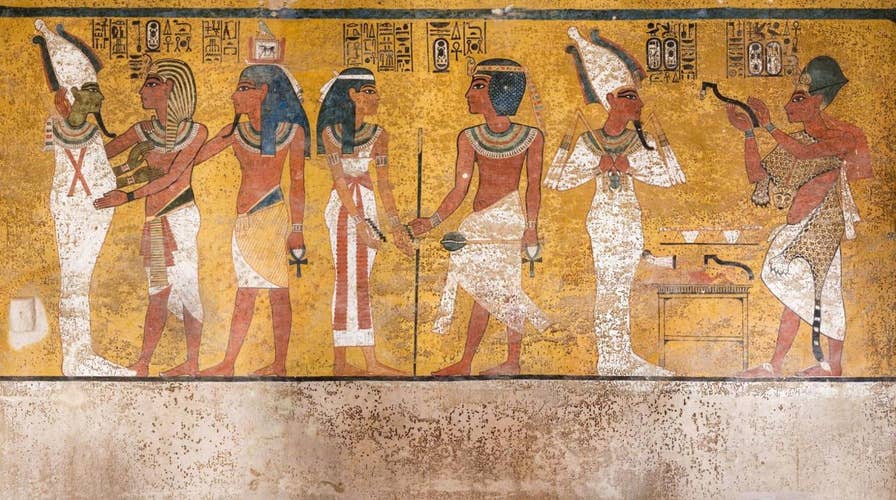Strange spots on King Tut's burial chamber's walls explained by experts
Strange spots on King Tut's burial chamber's walls explained by experts amid restoration of his tomb.
After years of political and cultural sparring, the restoration of the famed King Tutankhamen’s tomb was completed last week, a joint venture of the Getty Conservation Institute and Egypt’s Ministry of Antiquities.
Located in an area known as the “Valley of the Kings” in Luxor, Egypt, the popular tourist spot served as a shrine to the Egyptian pharaoh from the 18th dynasty – a period of history dating back more than 3,000 years.
King Tut, as he is colloquially known, has always been the source of popular fascination. For most of us, the images of his gilded coffin and quartzite sarcophagus is almost of another world, which it very much is, of course. Its discovery on November 26, 1922, was arguably the twentieth century's most famous archeological find.
KING TUT TOMB MYSTERY: EXPERTS EXPLAIN STRANGE SPOTS ON BURIAL CHAMBER'S WALLS
Howard Carter, the British archeologist who ultimately found the long-lost riches, had been searching unsuccessfully for the tomb for years. His benefactor and financier, English aristocrat Lord Carnarvon, had grown impatient with his failures and had threatened to pull funding. The search in 1922 that resulted in the discovery of his lifetime was slated to be his last attempt.
Making his way up a narrow staircase and drilling a small hole in a dusty door, Carter had just enough room to stick his head and arm inside. With a small, flickering candle, Lord Carnarvon waited anxiously behind him.
“Can you see anything?” the British financier asked him?
“Yes,” Carter answered. “Wonderful things. Wonderful things!”
I was thinking about that story the other night as President Trump addressed a joint session of Congress. Ringing the House chamber was a panoply of heroes ranging from World War II liberators, Holocaust survivors, community leaders, courageous children and even the former astronaut Buzz Aldrin, the man who walked and placed the American flag on the moon fifty years ago this summer.
If Vice President Mike Pence or Speaker of the House Nancy Pelosi had leaned over and asked our 45th president what he saw that night, it would have been wholly appropriate for him to look up and respond, “Wonderful things. Wonderful things!”
We live in an age of caustic cynicism, an era of taunts and tirades, agitators and activists. It would seem that too many people wake up each morning determined to seek out things to be offended and bothered by instead of throwing up their arms in wonder and amazement. Sadly, victimhood is perceived as both a vice and virtue.
If Vice President Mike Pence or Speaker of the House Nancy Pelosi had leaned over and asked our 45th president what he saw that night, it would have been wholly appropriate for him to look up and respond, “Wonderful things. Wonderful things!”
But, like Howard Carter with his candle inside King Tut’s tomb and President Trump in the U.S. Capitol the other evening -- look inside and look up. What do you see?
Yes, there are deep and growing concerns, rooted in an increasingly secular culture that devalues and cheapens life, liberty and the nation’s founding principles.
These are no small things. Human nature and the consequences of a fallen world will always result in an endless series of challenges.But if, like Howard Carter, you keep looking, searching and shining your light, what do you see?
In 21st Century America, I see many wonderful things.
Yes, there are the tangibles, many of which Mr. Trump mentioned in his speech and which can be measured on a daily basis.
We live in an era of unprecedented financial prosperity. A booming economy and stock market, low unemployment, a strong housing market, burgeoning entrepreneurism and a host of other positive economic indices that is resulting in the creation of more millionaires and billionaires than ever before in our nation’s history.
Medical technology and pharmacological advancements have resulted in the eradication of once deadly diseases and have extended both the quality and the average lifespan of human beings. A message that once took months to deliver now takes milliseconds, to name only just a fraction of human improvements in the last century alone.
Americans are among the most generous of any nation in the world. In 2018, our citizens voluntarily gave over $400 billion to charities.
Our country's churches represent a vast network of spiritual and social assistance, most of which are staffed by non-paid personnel and bi-vocational pastors.
The United States military, the fiercest fighting force on earth, is comprised entirely of men and women who voluntarily put themselves in harm’s way.
Then there are our first responders, our police and fire and other emergency personnel who run in while everyone else runs out. They're in every corner of the country, serving selflessly and sacrificially, often working long hours when the rest of us are safely and comfortably home with our families.
But the reality, of course, is that the most wonderful things we see today aren’t really things at all. They’re people – people of all shapes, sizes, races, creeds and colors -- all doing magnificent and marvelous things -- from the mother and father raising a child with special needs to a spouse faithfully, lovingly and dutifully caring for their husband or wife with Alzheimer's.
CLICK HERE TO GET THE FOX NEWS APP
What do you see, America?
In the end, like Howard Carter, we need to keep moving, keep digging - and keep shining our light on the many wonderful things - and people - who surround us, if only we would take a moment to look up and take note.









































